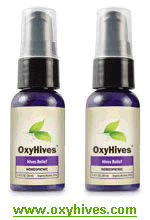Hives Treatment Center Over 150,000 patients helped since 2001
![]()
 What Are Toddler Hives?
What Are Toddler Hives?
Hives on toddlers are also called urticaria or simply welts. These are swollen areas on the surface of the skin that can vary in size and location, but have well defined edges with a pale center and a red border. Toddler hives normally cause itching, and can move from place to place. Hives and toddlers are concurrent, as your child’s immune system is still maturing and learning what a serious allergen is and what isn't.
Hives and toddlers are very commonly seen together. Your toddler could have a small group of hives that goes away within a few minutes or even a couple of hours, and then a few hours later another group shows up. It is possible for hives and toddlers to stick together for a few months, which is considered chronic hives.
Best Hives Treatment For Toddlers |
|
 |
What Causes Toddler Hives?
Toddler hives are caused by your toddler's immune system sensing an allergen being present. The child’s immune system sends out histamine into the blood stream to combat the allergen and remove it from the body. This is what causes the raised red welts, swelling and itching. Since your child’s immune system has not experienced all the things that adults’ immune systems have been through, they do not know yet that something as simple as sun exposure (i.e. sun hives) is not an allergen.
There are many things that cause hives in toddlers including but not limited to food allergies, pollen, animals or pets, bug bites and stings, sun, heat, cold, infections, illness, fever, medications and even using certain soaps and detergents. As an example, my daughter is allergic to egg whites. If she eats them, she'll throw up - usually on her bed. However, if she gets them on her skin, she'll break out in the worst hives rash I've ever seen! And not just on the spot where she got the egg, but all over her arms and face.
What Are Toddler Hives Symptoms?
The most common toddler hives symptoms are raised welts on various parts of your toddler's body that most likely itch intensely. Your toddler may not actually itch at them, but simply cry over the discomfort. While your toddler may not be able to put the sensations they are experiencing into words yet, toddler hives are usually accompanied by a burning sensation at the spot of the outbreak.
Toddler hives can also have other symptoms, depending on what triggered the outbreak. If your toddler has an infection that is causing the hives, then your child may have a runny nose, cough, slight fever or a sore throat.
Are Toddler Hives Dangerous?
Hives and toddlers is nothing to be afraid of, as hives are not contagious. However, if you notice facial swelling (medically referred to as angioedema), which starts restricting the airflow to your toddler call 911 immediately. The swelling may be cutting off their airflow which will lead to them passing out and dying if the airflow is cut completely.
How Do I Get Rid Of Toddler Hives?
Most parents contact their pediatrician to seek advice on what to do next and what treatment options they should consider. Most will simply suggest an over the counter antihistamine, such as Children's Benedryl. This does not cure the hives; it simply helps with the itching until the hives go away on their own. A nice soothing oatmeal bath in luke warm water (not hot water) will take the edge off the itch too. My 2 year old daughter loves to mush the oatmeal up in her hand, which takes her mind off the hives outbreak completely. Remember to NEVER give them a hot bath as this will enflame the hives and make the itch even worse.
When it comes to hives and toddlers, there are few medications that are suggested simply based on their age. Our treatment page offers information on the hives medication OxyHives. This medication is available without prescription, and will not simply mask the itch and redness like antihistamines do. We have yet to hear of a toddler that minds taking the medication, because there is no awful taste for them to have to swallow. OxyHives has no side effects like so many other treatments, and you can use it as much as you need to. With OxyHives there is no more itching and no more worrying about your toddler's hives.
Toddler hives do not have to be a scary experience for you or your little one ever again. With OxyHives, your toddler will be back to playing and laughing like nothing ever happened. It is important to keep track of the causes of hives your toddler has, as well as the medications or foods he or she has had during that time. Looking at this over time will show you similarities so you know what triggers to help them avoid in the future.